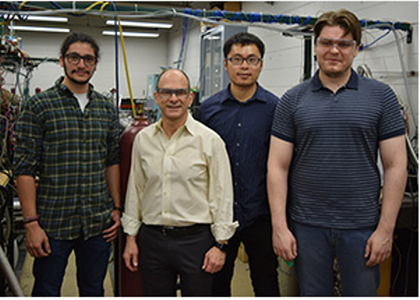Professor Ken Brezinsky awarded $551,631 AFOSR grant
story title Heading link

New Grant is One of Three as the Sole Principal Investigator in Less Than a Year
Professor Kenneth Brezinsky is on a roll! The prolific researcher recently began work on a grant that is one of three received in less than a year for a total of nearly $1.3 million in research funding. The professor in the Department of Mechanical and Industrial Engineering (MIE) is the sole principal investigator (PI) for all three awards. Each grant is for a different research project, but they all have a common thread – fuels for either aircraft engine or ground transportation.
Brezinsky, who is the Associate Dean for Research & Graduate Studies in the UIC College of Engineering, was awarded a $551,631 grant from Air Force Office of Scientific Research (AFOSR) for a project called “Pyrolysis and Oxidation Studies of Real Propulsion Fuels.” The four-year grant is geared toward expanding his research on the development of advanced chemical reaction mechanisms in collaboration with a leading group of researchers in the AFOSR’s propulsion program.
“The aim of this study is to provide experimentally determined concentrations of intermediate chemical products of the pyrolysis and oxidation of currently used military jet fuels as a function of temperature and pressure,” said Brezinsky, who also is the director of the High Pressure Shock Tube Laboratory. “These values are expected to serve as inputs into emerging models for fuel combustion that have taken advantage of the observation that within a given combustion reaction, there is a separation in time, temperature, and position within a combustion chamber between the pyrolysis process pathways — which can be lumped together for kinetics modeling — and the onset of oxidation.”
The new studies are made possible by the well-established and proven UIC Single Pulse Shock Tubes. The experiments will be conducted using a wide-range of high pressure, extreme temperatures, and a nominal reaction time of 2 to 6 milliseconds.
“I am examining United States Air Force relevant fuels,” said Brezinsky. “The Air Force is especially interested in experimental data that can be used to validate predictive models that they can potentially use for the design of advanced aircraft engines.”
The grant period started on Dec. 15, 2015 and runs until Dec. 15, 2019.
In July 2015, he received a $300,000 grant from the National Science Foundation (NSF) to continue his research on the “High Pressure Ring Contraction of Cyclic Hydrocarbons.”
The three-year research will address general science problems that are directly relevant to the cooling processes in aircraft engines. The professor and his team of Ph.D. students — Juan Guzman, Miroslaw Liszka and Xu Han — are investigating the chemistry of the burning of the aircraft fuels under operating conditions.
“Advanced aircraft engines need advanced fuels, and part of the function of the advanced fuels is to cool the engine so that the combustion process doesn’t damage the engine,” said Brezinsky. “And the fuels, before they are burned, can be used as part of the cooling process. During the cooling process, they can undergo certain chemical reactions at these high pressures and high temperatures that we will be studying.”
Brezinsky’s third grant, beginning March 1 and lasting three years, is an allocation of $439,302 from the Army Research Office (ARO) for work entitled “A New Approach to the Combustion Chemistry of Low Cetane Number Jet Fuels”. The research focuses on the examination of chemistry related to diesel engines and how it relates to the operation of tanks.
“Tanks run on the ground and use diesel engines. On the surface you wouldn’t think there would be a connection between aircraft fuels, which are obviously used for flying, and diesel engines, which are operated on the ground,” said Brezinsky. “Except that the Department of Defense wants to run all vehicles on a single fuel. And that single fuel would be a JP-8 (Jet Propulsion 8) aircraft fuel equivalent.”
The Army’s “Single Fuel Forward” initiative mandates that when logistically necessary, diesel engines must be able to use jet fuel instead of standard diesel fuel. It is advantageous in a combat situation to have the same fuel running aircrafts and diesel engines. They will use a single fuel, and the military won’t have to ship a special fuel for the tanks and special fuel for the aircrafts.
“That makes sense. The consequence is that diesel engines need to run on jet fuels, rather than normal diesel fuel,” he said. “There is a mandate and encouragement to use alternative sources of jet fuel. These alternative fuels will meet jet fuels physical specifications, but will have a different chemical composition. Because of the different chemical composition, they may not work well in a tank diesel engine.”
For this project, his work is focusing on the chemistry of alternative jet fuels for application in army diesel engines.
It is quite an accomplishment to be the sole PI for three grants. It will allow him to focus directly on his vision for each project, while maintaining a common connection.
“In my mind, the theme is aircraft fuels, the chemistry of aircraft fuels at conditions relevant to their use,” said Brezinsky. “Either in an air force flying jet or a tank diesel engine, or used as part of the thermal management of an aircraft.”
To learn more about the professor’s research, please visit the High Pressure Shock Tube Laboratory.